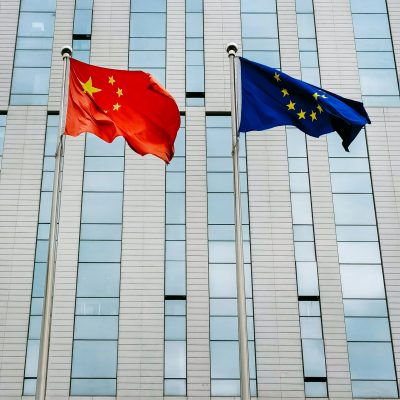[FR] Trade war: ‘Europe can still make a difference’
This publication is available in french.
The European Union, the world’s leading trading power, must push Washington and Beijing to return to the multilateral table, writes Elvire Fabry in an article published in Le Monde.

Op-ed. In the trade war launched by Donald Trump, Europeans have only a narrow margin for manoeuvre. For the past two years, they have been walking a tightrope between Washington and Beijing. The American president makes reducing his trade deficit a matter of national security and is withdrawing from multilateral rules. For its part, China—now described by Brussels as a “systemic rival”—engages in unfair competition by exploiting WTO loopholes to massively subsidise its state-owned enterprises. For the European Union, the challenge is to contain Washington’s protectionist assaults, but even more, to prevent a return to a Wild West-style international trade system.
Europe, the world’s leading trading power, can still carry weight in preserving the framework of international trade rules and defending a European-style globalisation with more regulation—at a time when multilateralism is most needed to manage the new major global challenges (climate change, digital regulation).
The European Commission has responded firmly and swiftly to the American tariff offensives, avoiding a protectionist bidding war. If, after steel and aluminium, Washington targets car imports, the Europeans have already prepared a new countermeasure on €35 billion worth of U.S. goods, which remains WTO-compliant. They are ready to engage in bilateral negotiations on the industrial sector, without yielding on opening up the agricultural market, which Washington demands. But these initiatives may not be enough to prevent an open crisis in multilateralism.
A lasting confrontation
Beijing’s response to Washington’s escalation confirms its resilience and signals a long-term confrontation. The step just taken in the American escalation marks a threshold. Until now, tariffs on Chinese imports mainly affected intermediate goods or spare parts. Companies could absorb the extra cost without passing it on to consumers. But now, nearly all Chinese imports to the U.S. are hit by tariffs of nearly 25%, up from 3% two years ago. With a direct impact on consumption (clothing, toys…).
“The tone has just been set by the new President of the European Commission, Ursula von der Leyen: the EU must be equipped with a more assertive arsenal of instruments.”
In turn, as a retaliatory measure, the average tariff applied by Beijing on American imports will reach 26% by the end of 2019, compared to 8% in January 2018, while it has decreased to 7% for the rest of the world. Although Beijing is sparing a third of U.S. imports to protect its own economy, the damage is already global. With the lengthening of production chains, companies in third countries are also affected by the tariff hikes. Faced with the global economic slowdown caused by this instability—and the risk that this titanic clash ends with mere bilateral concessions—Europeans have no choice but to be more determined.
The tone has just been set by the new President of the European Commission, Ursula von der Leyen: the EU must equip itself with a more assertive arsenal of instruments, starting with the application of trade sanctions and the creation of a trade prosecutor to oversee them.
Strengthening WTO rules
Strengthening WTO rules on subsidies is a decisive objective. Pressure from the EU to get China to commit to concrete pledges on this point would help anchor the United States more firmly within the WTO. The EU can also take unilateral initiatives by adopting the international procurement instrument, which ensures more reciprocity with third countries, and by shifting the burden of proof onto foreign companies to demonstrate compliance with the WTO agreement on subsidies and countervailing measures.
“These initiatives by the European Commission, which mainly target China, must be supported by greater cohesion among EU Member States in their approach to Beijing.”
It is also necessary to swiftly activate the European mechanism for screening foreign investments to better identify such subsidies. But these initiatives by the European Commission, which mainly target China, must be supported by greater cohesion among EU Member States in their approach to Beijing. As long as each Member State privileges bilateral ties with Beijing—seduced by the allure of access to the Chinese market and the investments promised by the “Belt and Road Initiative”—Europeans will not be able to exert their full weight in this trade war or use the attractiveness of the European market as leverage, especially as the American and Chinese markets close off.
There are many tasks ahead. Among them, promoting the euro in international markets—including through trade negotiations—is essential to better counter U.S. extraterritorial practices. It is also necessary to build plurilateral coalitions to develop international trade rules on sustainable development, starting with a set of measures aimed at “greening” European trade. A rare opportunity for European leadership on the world stage.
Elvire Fabry
senior researcher at the Institut Jacques-Delors.




